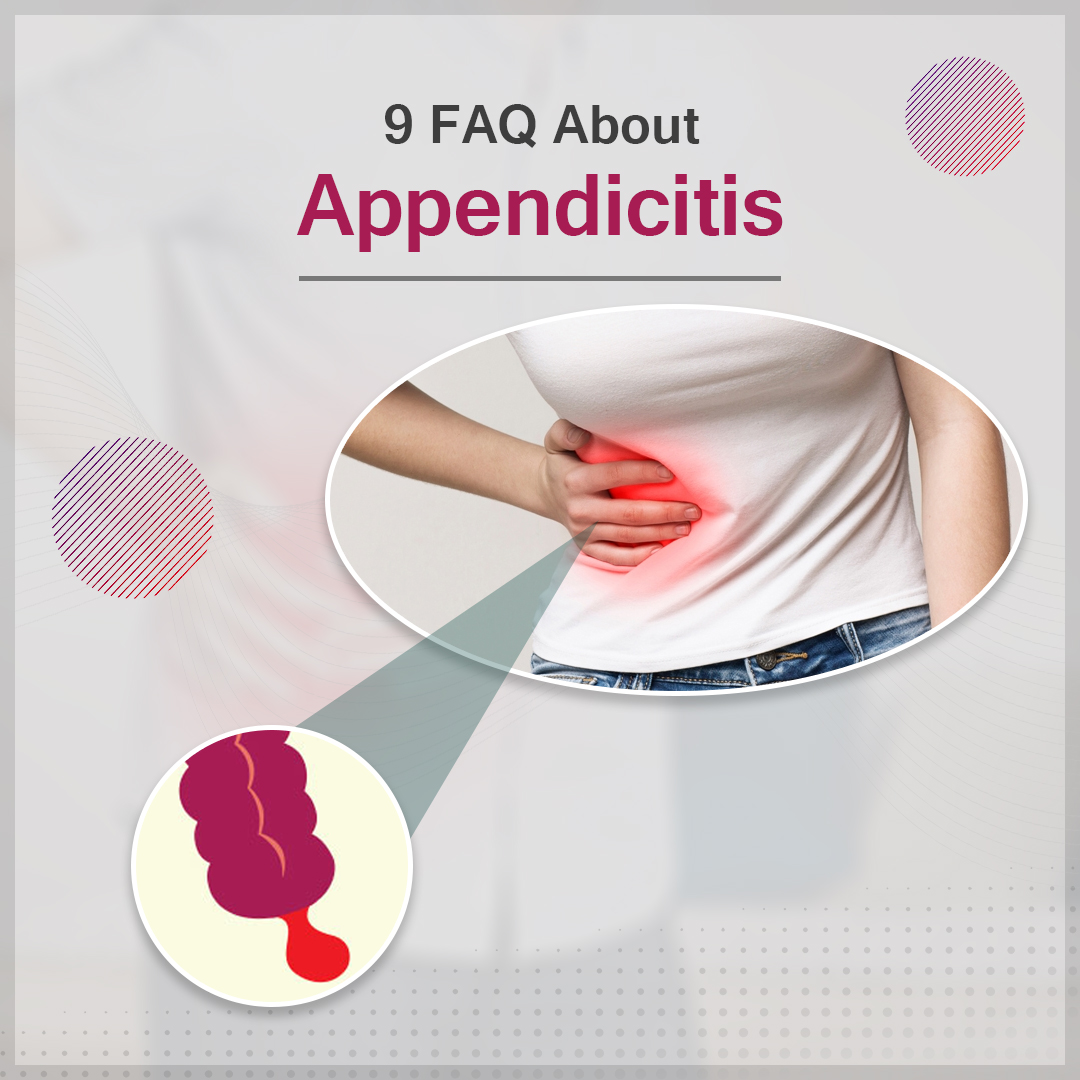Q1: Where is the appendix located in your body?
Answer: The appendix is a tiny structure attached or an extension of a cecum, starting of a large colon. So it’s located near the junction of the small and large bowel.
Q2: What is appendicitis?
Answer: Appendicitis is a condition in which the appendix becomes inflamed.
The appendix can get inflamed if infected with bacteria, viruses, or fungi, leading to appendicitis.
Q3: The cause of appendicitis is unknown. True or false?
Answer: True.
There is no single cause of appendicitis, but there are several possibilities, including:
- Fecal matter (fecaliths, or “appendix stones”), parasites, or growths that can obstruct your appendiceal lumen.
- Inflammatory bowel disease, such as Crohn’s disease.
- Ulcerative colitis – Infection in the gastrointestinal (GI) tract.
- Injury or trauma to the abdomen.
Q4: What are the signs and symptoms of appendicitis?
Answer: Appendicitis symptoms usually begin with mild pain near the belly button that travels to the lower right quadrant of the belly and grows sharper over several hours to a few days.
When you try to move, take heavy breaths, cough, or sneeze, the discomfort usually worsens. The pain can come on abruptly and be very strong, unlike any other abdominal discomfort you’ve had previously.
Other appendicitis symptoms that accompany stomach pain include: –
– Appetite loss
– Nausea and/or vomiting – Bloating or swelling in the abdomen
– Constipation, diarrhoea, or gas (or an inability to pass gas)
– Fever
Feeling as if having a bowel movement will relieve the discomfort – Pain in other areas of the belly, back, or rectal area
– Fever
– Urination that hurts
– Urination that hurts
Q5: Appendicitis is a severe medical condition. Is this true or false?
Answer: True. Appendicitis is a severe medical condition. If you suspect you could have appendicitis, go to an emergency room.
If you have appendicitis, your appendix will most likely need to be removed (an appendectomy).
A ruptured (burst) appendix is less likely after an appendectomy. Laparoscopic surgery (smaller incisions) is performed to remove the appendix allowing a faster recovery.
Antibiotics may also be used to treat mild appendicitis in some instances, while the usual therapy for appendicitis remains appendectomies.
Q6: Appendicitis is a life-threatening condition. Is this true or false?
Answer: True. Appendicitis is a medical issue that can be lethal if left untreated.
The appendix contains germs that are generally innocuous, but these bacteria destroy the appendix’s walls when you have appendicitis. The appendix wall can rupture if left untreated, causing the contents of the appendix to flow into the surrounding tissue and cause peritonitis or inflammation of the abdominal lining. It can result in sepsis (the body’s response to an infection going into overdrive), organ failure, and death.
Q7: Who are the people who are most likely to get appendicitis?
Answer: Appendicitis is most frequent in adults aged ten to thirty, with the highest frequency in those aged ten to nineteen. Men have a slightly greater rate of diagnosis of appendicitis than women.
Q8: Can you tell me about the long-term effects of an appendectomy?
Answer: An appendectomy removes your appendix, relieving pain and eliminating the risk of rupture and infection. Most patients recover completely within 2 to 6 weeks after surgery and have no serious, long-term health issues.
The majority of people do not need to alter their diet, exercise routine, or lifestyle.
An appendectomy, like any other surgery, is not without danger. Complications can still occur, such as an allergic reaction to drugs, incision infection, the appendix rupturing during the treatment, and other issues. Before the procedure, discuss the risks with your surgeon.
Q9: The only way to treat appendicitis is to have surgery. Is this true or false?
Answer: False.
In the case of appendicitis, appendectomy is the most common therapeutic option. The only method to prevent the appendix from perforating and causing peritonitis or other issues in the future is to remove it.
On the other hand, antibiotics can be beneficial in some individuals for whom surgery is not possible, such as those who have just had a heart attack, significant medical issues, and pregnant women in the first trimester.





